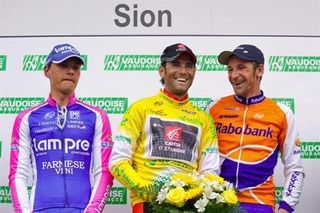Spanish commentators critical of Valverde’s ban
Critics round on CAS decision

Reaction to the two-year ban imposed on Alejandro Valverde by the Court of Arbitration for Sport (CAS) has been generally supportive of the Caisse d’Epargne rider. In line with his team’s description of the ban as “unjust and incoherent”, commentators have questioned the severity of the sanction, pointing that Valverde has already missed the opportunity to ride the Giro and Tour in 2009, and cannot now consider competing in either until 2012. He has effectively been banned for three years, they say.
Writing in El País, renowned cycling journalist Carlos Arribas pointed out that “no cyclist implicated in Operation Puerto has received a sanction as harsh as this”. Referring to the UCI’s decision to strip Valverde of the results he’s gained this year, Arribas commented, “Ivan Basso wasn’t stripped of the 2006 Giro title which was won while the Operation Puerto investigation was under way”. Arribas added that “no other Spanish rider of the dozens said to be implicated has been sanctioned and neither the UCI nor the World Anti-Doping Agency has requested that action be taken against them.”
El Mundo cycling correspondent Pablo de la Calle commented that what had already been a long-running case was further extended by an “absolute” desire to avoid a clash with the Giro. “The Giro’s organisers have a close relationship with the CONI [Italian Olympic Committee], and they couldn’t allow the CAS’s verdict to replace the action taking place at the race as the principal focus of attention,” De La Calle wrote.
There was further criticism of the length of the whole procedure from Spanish cycling federation lawyer Jorge Ibarrola. With Valverde facing payment of costs amounting to about €80,000, Ibarrola said: “Without the delays being any fault of his own, Valverde is having to pay for the consequences of the slowness and delays in the whole procedure, and has also received a bigger sanction than he would have had for a positive test.”
There was criticism too from Spanish cycling federation president Juan Carlos Castaño, although his comments were aimed in a different direction. After stating his “respect and compliance” with the verdict of the CAS, Castaño voiced his unhappiness that the federation was not able to assess the case against Valverde in the first place.
“The decision should have been the Spanish federation’s to take in line with precedents established in Spain and also in line with Spanish law. We asked the judge overseeing the Puerto investigation to release evidence so that we could start proceedings, but we received a negative response,” said Castaño.
Unable to assess whether Valverde was guilty or not, the Spanish federation became no more than an onlooker as firstly the Italian Olympic Committee and the then the UCI and WADA took action against the Spanish rider.
Get The Leadout Newsletter
The latest race content, interviews, features, reviews and expert buying guides, direct to your inbox!
Peter Cossins has written about professional cycling since 1993 and is a contributing editor to Procycling. He is the author of The Monuments: The Grit and the Glory of Cycling's Greatest One-Day Races (Bloomsbury, March 2014) and has translated Christophe Bassons' autobiography, A Clean Break (Bloomsbury, July 2014).
Most Popular

